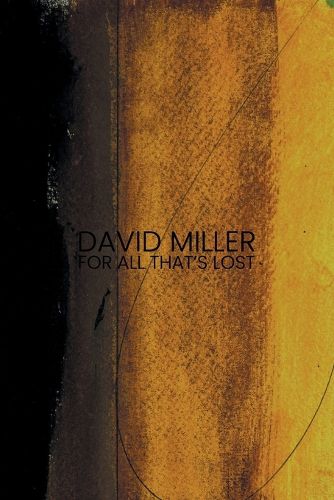Readings Newsletter
Become a Readings Member to make your shopping experience even easier.
Sign in or sign up for free!






This title is printed to order. This book may have been self-published. If so, we cannot guarantee the quality of the content. In the main most books will have gone through the editing process however some may not. We therefore suggest that you be aware of this before ordering this book. If in doubt check either the author or publisher’s details as we are unable to accept any returns unless they are faulty. Please contact us if you have any questions.
David Miller's For All That's Lost realises once more his mastery of prose, the prose poem, and discreet, short lyric in book-length series. The book develops the major concerns of his work elsewhere about Time, duration, the simultaneous and synchronicity. The opening sequence, 'The Remains, ' is predicated on the "if," the hinge of ambiguity, opening out all aspects of Miller's spirituality, which suffuse his whole work. This is a book about "building a narrative," which it does magnificently and literally across Time, spanning the entirety of the poet's writing life, recalling the melodies and repetitions of "The Song of Songs". Miller is a poet, painter, musician, and the work of David Jones and Blake come immediately to mind as forebears, but the poems-in-pictures, pictures-in-poems as scopic realities to this book put me in mind of the late Tang master, Wang Wei.
Simon Smith
For all that's lost speaks, to quote Benjamin, in a 'now-time shot through with splinters of messianic time': the impetus of an intimate yearning that goes back to come upon the moment of lost love's encounter, as it reinvents itself. Each moment is a vivid instant of turn in the surface of reality that simultaneously enlightens and obscures, a palimpsest of miracles: for instance, the Japanese painter, who flies like the blackbird of another moment in another poem, past road signs as they fly by him, inspired to produce paintings of 'simplicity and directness'. The resulting poems are a form of miniature sublime. As are the alchemical reductions of the purely visual sequence Again: black ink in the palace of bees: its own poetic imperative. In the infra-thin the kingdom of heaven is at hand both spatially and temporally. The blackbird is opening its beak - 'he has already spoken /and continues to speak'.
Patricia Farrell
$9.00 standard shipping within Australia
FREE standard shipping within Australia for orders over $100.00
Express & International shipping calculated at checkout
This title is printed to order. This book may have been self-published. If so, we cannot guarantee the quality of the content. In the main most books will have gone through the editing process however some may not. We therefore suggest that you be aware of this before ordering this book. If in doubt check either the author or publisher’s details as we are unable to accept any returns unless they are faulty. Please contact us if you have any questions.
David Miller's For All That's Lost realises once more his mastery of prose, the prose poem, and discreet, short lyric in book-length series. The book develops the major concerns of his work elsewhere about Time, duration, the simultaneous and synchronicity. The opening sequence, 'The Remains, ' is predicated on the "if," the hinge of ambiguity, opening out all aspects of Miller's spirituality, which suffuse his whole work. This is a book about "building a narrative," which it does magnificently and literally across Time, spanning the entirety of the poet's writing life, recalling the melodies and repetitions of "The Song of Songs". Miller is a poet, painter, musician, and the work of David Jones and Blake come immediately to mind as forebears, but the poems-in-pictures, pictures-in-poems as scopic realities to this book put me in mind of the late Tang master, Wang Wei.
Simon Smith
For all that's lost speaks, to quote Benjamin, in a 'now-time shot through with splinters of messianic time': the impetus of an intimate yearning that goes back to come upon the moment of lost love's encounter, as it reinvents itself. Each moment is a vivid instant of turn in the surface of reality that simultaneously enlightens and obscures, a palimpsest of miracles: for instance, the Japanese painter, who flies like the blackbird of another moment in another poem, past road signs as they fly by him, inspired to produce paintings of 'simplicity and directness'. The resulting poems are a form of miniature sublime. As are the alchemical reductions of the purely visual sequence Again: black ink in the palace of bees: its own poetic imperative. In the infra-thin the kingdom of heaven is at hand both spatially and temporally. The blackbird is opening its beak - 'he has already spoken /and continues to speak'.
Patricia Farrell